Teenage years are tough for everyone. It’s a time of big changes—physically, emotionally, and socially. But for teens with limb differences, it can feel even harder. They’re not just trying to figure out who they are. They’re doing it while facing questions, stares, and challenges most of their friends don’t understand.
At RoboBionics, we’ve met many young people who are brave, bright, and full of potential—but still struggle to feel confident in their own skin. That’s why we believe recovery should be more than physical—it should help teens build pride, independence, and joy.
Gamified recovery gives them a way to do that. Through playful practice, personal wins, and peer encouragement, teens begin to feel stronger—not just in their movements, but in who they are.
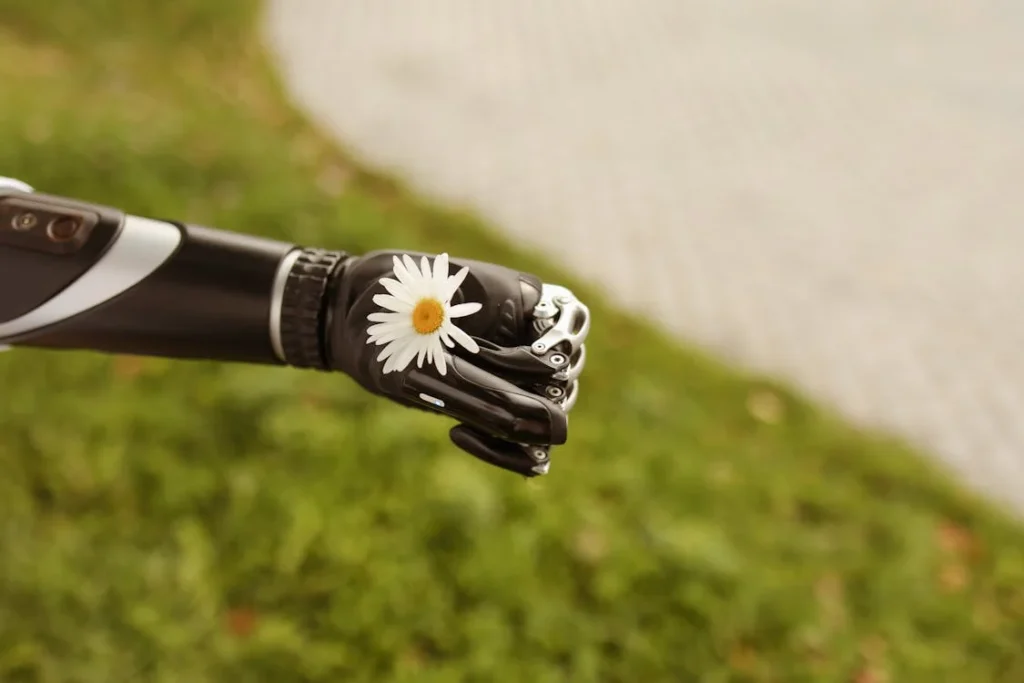
Why Confidence Is Everything for Teens With Limb Differences
Understanding the Emotional Weight Behind the Smile
Most teenagers just want to fit in. They want to walk into a room and feel like they belong. For teens with limb differences, though, that simple desire often comes with extra fear. They worry about how people look at them. What questions will come up. Whether they’ll be accepted. Sometimes, that pressure is heavier than the physical challenge itself.
Many teens become experts at hiding their discomfort. They smile. They make jokes. They say, “I’m fine.” But underneath, they might feel isolated or different. Not because they lack ability—but because they’re unsure of how the world sees them.
That’s why building confidence matters so much. Not just to feel better emotionally—but to show up fully in school, in friendships, in everything that matters.
At RoboBionics, we believe that real confidence comes from two things: the ability to do something and the belief that what you do matters. That’s where gamified recovery plays a powerful role. It gives teens the tools to grow their skills and the space to feel proud of every step.
Small Wins That Feel Like Big Triumphs
Teenagers with limb differences face so many invisible battles. They’re figuring out how to move differently, how to dress, how to do daily tasks—and they’re doing all of that while trying to stay upbeat and social. That’s a lot to carry.
In a traditional therapy setup, progress can feel slow and boring. But in a gamified system, every small success becomes a reason to celebrate.
With our gamified rehab app, for example, teens get instant feedback. When they grip something well, they get a badge. When they master a motion, they unlock a new level. It might seem small, but to a teen who’s been struggling silently, that tiny “You did it!” moment feels huge. It’s not just a digital star—it’s a confidence boost.
Over time, these little wins stack up. The teen who once felt unsure about using their prosthetic now looks forward to training. Not because they have to—but because they want to. They start to take pride in what their body can do. That pride shifts how they see themselves, and how they carry themselves in the world.
Making Practice Fun, Not Frustrating
Let’s be honest—teens hate boring routines. And that includes repetitive rehab tasks. Ask a teenager to repeat the same movement over and over, and you’ll probably get a sigh or a shrug. But ask them to beat a level, improve a score, or unlock something cool? That’s different.
Gamified rehab taps into that part of the brain that loves progress, play, and competition. It takes something that could feel like a chore and turns it into a challenge. A goal. A game.
With the Grippy™ Bionic Hand or Grippy™ Mech Hand, for example, teens get to control the hand using their own muscle signals. That’s already empowering. But when the app gives them fun, age-friendly challenges like picking virtual objects, racing a timer, or matching patterns—suddenly, it’s not just rehab. It’s something to look forward to.
This shift in mindset—going from “I have to do this” to “I want to beat this”—is a game-changer. It boosts engagement. It keeps them practicing longer. And it builds confidence in a way that feels natural.
Belonging to a Community That Gets It
One of the biggest things teens with limb differences need is to know they’re not alone. They need to see others like them—not just surviving, but thriving. That’s where community becomes essential.
Our gamified platform isn’t just about movement. It’s about connection. Teens can see others their age earning rewards, sharing tips, celebrating wins. They start to realize: “Hey, I’m not the only one learning this grip.” Or, “I’m not the only one who struggled with that level.”
Those moments of “me too” are everything. They create a sense of belonging. And for a teenager, that feeling of being understood, without needing to explain everything, is priceless.
We’ve seen teens go from quiet observers to bold encouragers in our online communities. They start posting their scores, offering advice, even cheering on others. That act of helping someone else boosts their own confidence. It shifts the focus from “what I can’t do” to “look what I’ve learned—and can share.”
That peer support becomes a lifeline, especially on tough days. It reminds them they’re part of something bigger. That their journey matters.
Confidence Isn’t Just About Movement—It’s About Identity
For teens, everything ties back to identity. Who am I? What do I stand for? Am I strong, smart, cool, capable? Every win, every challenge completed, helps answer those questions.
When a teen starts using a tool like the Grippy™ Mech Finger and begins mastering tasks, it’s not just physical growth. It’s emotional growth. It’s saying, “I can adapt. I can succeed. I can be me—fully.”
That sense of identity is powerful. It spills into other areas of life. Suddenly, they’re speaking up more in class. They’re engaging in hobbies again. They’re walking taller—not because everything’s easy, but because they believe they can handle the hard parts.
And once that belief takes root, everything changes.
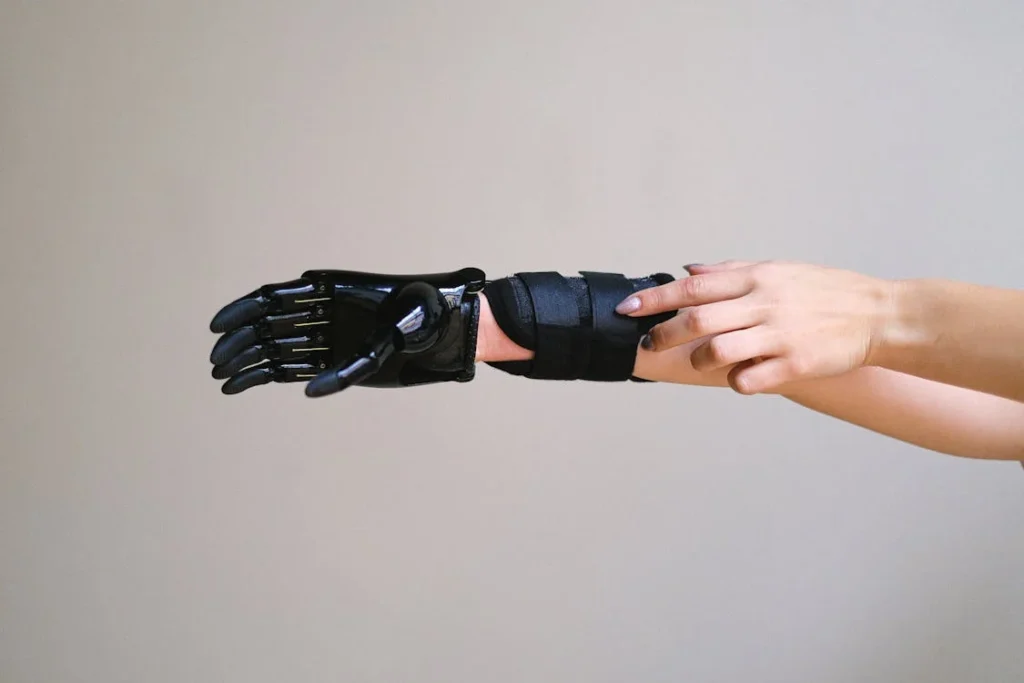
How Gamified Recovery Builds Trust in Their Own Body
From Awkward to Aware: Helping Teens Feel In Control Again
After a limb difference—whether from birth or an accident—many teens describe feeling disconnected from their body. Even with a prosthetic hand or finger in place, it can feel foreign at first. Movements seem awkward. Tasks take longer. The mind wants one thing, but the body doesn’t always follow.
That gap between intent and action can create doubt. Teens might start thinking, “Maybe this isn’t for me.” Or worse, “I’m not good at this.” That’s where early trust-building becomes crucial.
With gamified rehab, that trust is built step by step, without pressure. Every time a teen completes a small action—gripping an object, holding something steady, activating a muscle group—the app gives them instant proof: Yes, your body did that. Yes, it worked.
That feedback loop helps rebuild the relationship between mind and muscle. It takes something invisible, like learning muscle control, and makes it feel visible and real. Teens begin to believe: “I can do this. My body listens. It’s learning.”
That shift—from doubt to trust—is often the quiet moment when confidence truly starts to grow.
Engaging Their Curiosity, Not Just Their Discipline
Teens have so much curiosity. They love to explore, try things, test boundaries. Traditional rehab programs often miss this. They focus only on doing things “right.” But teens learn better when they’re free to try, to mess up, and to try again.
Gamified recovery invites that spirit in.
In the app, it’s okay to fail a level. It’s okay to experiment. There’s no punishment—just another chance. This takes the fear out of learning and makes room for discovery.
We’ve seen teens with their Grippy™ Bionic Hand come alive when they find new ways to play. They start asking questions. “What happens if I move this faster?” “Can I hold a heavier object?” “How many stars can I earn today?” That kind of curiosity is gold—it means they’re invested. They’re engaged. They’re teaching themselves, not just following directions.
That self-driven learning sticks. It creates deeper confidence because it comes from exploration, not just instruction.
Creating a Private Space to Practice Without Pressure
Teens are self-conscious, even without limb differences. Add a prosthetic into the mix, and that feeling gets amplified. Many teens are hesitant to practice in front of others—afraid they’ll look strange, or slow, or unsure.
That’s why having a private, gamified training space is so powerful.
With our platform, teens can train in their room, on their own time, without anyone watching. They can make mistakes without embarrassment. They can experiment, retry, and succeed—all in a safe, judgment-free space.
And the best part? Every time they reach a goal, they don’t just see it—they feel it. That private win turns into personal pride. They might not say it out loud, but inside, they’re thinking: “I did that.”
Later, when they’re out in the world—at school, with friends, in public—they carry that quiet pride with them. And it shows. In the way they move. In how they speak. In the way they stop hiding their hand and start using it with confidence.
That internal transformation often begins in those quiet, solo moments of practice. And it’s why privacy and gamification together are so effective.
Celebrating Their Style, Not Just Their Strength
Every teen is different. Some are shy. Some are bold. Some want to blend in. Some want to stand out. That’s why prosthetic recovery shouldn’t be one-size-fits-all. It should let them bring their personality into the process.
Gamified systems allow for that kind of personalization. Whether it’s customizing their avatar in the app, choosing the challenges they want to tackle, or deciding how to pace their own growth, teens feel like the system is made for them—not forced on them.
This sense of control makes a huge difference. It tells them, “You’re not just a patient. You’re a person with style, goals, and choices.”
And when they pair that control with something like our sleek, lightweight Grippy™ Mech Finger or Grippy™ Mech Hand, their confidence only grows. They begin to see their prosthetic not as something that hides their difference—but as something that expresses their strength.
We’ve had teens paint their hand covers. Give them nicknames. Coordinate them with outfits. That sense of ownership matters. It turns something medical into something meaningful.
It turns “What happened to your hand?” into “Wow, that’s cool.”
Confidence in One Area Unlocks Confidence in Others
One of the most beautiful things we see at RoboBionics is how confidence in physical ability spills into other areas of life. A teen who once hesitated to speak up in class suddenly starts raising their hand. The one who avoided sports now wants to join a group. The one who stayed quiet in the family starts offering help at home.
This ripple effect is real.
When teens start believing they can learn hard things—when they see proof in the form of earned badges, better movement, and positive feedback—they stop doubting themselves. That belief doesn’t stay in their hand. It travels to their heart, their voice, their presence.
And that’s what gamified recovery is really about: not just building stronger muscles, but building a stronger sense of self.
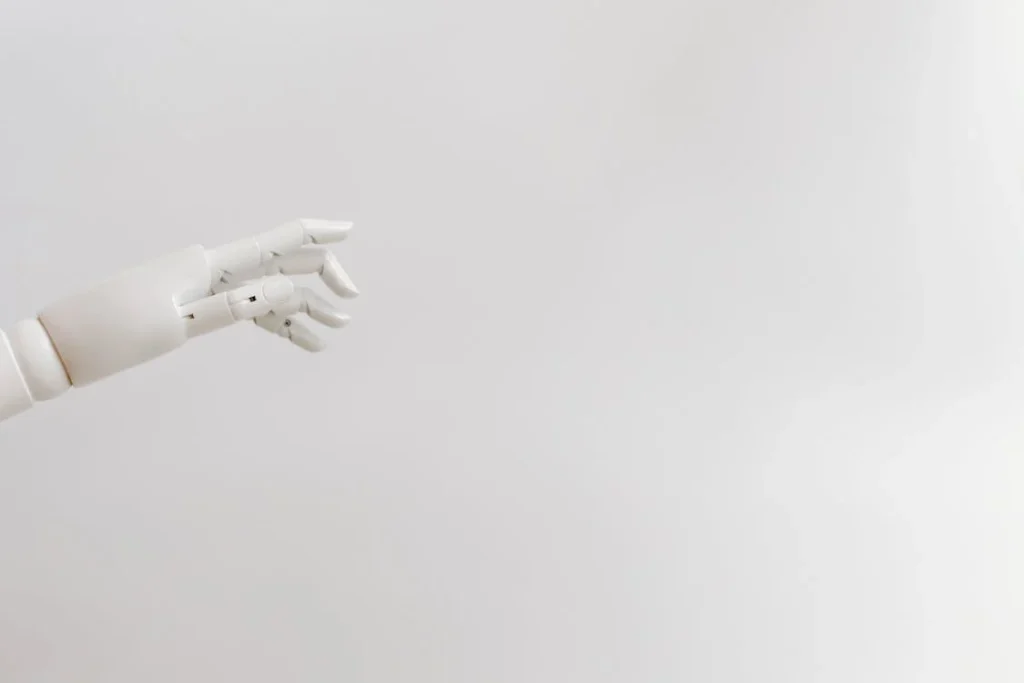
Giving Teens Control Over Their Recovery Journey
Why Autonomy Builds Confidence Faster Than Instructions
Teenagers don’t want to be told what to do all the time. They’re at an age where independence matters. They want to make their own choices—even if they don’t always say it out loud. This truth becomes even more important when a teen is recovering from limb loss or learning to live with a prosthetic. The more control they have over their progress, the more motivated they become.
That’s where gamified recovery shines. Instead of following a rigid therapy plan, teens get to pick their path. They choose what to work on today. They decide which level to play. They set their own pace. That sense of control helps them feel like recovery isn’t happening to them—it’s happening with them.
The platform encourages practice, but it doesn’t punish mistakes. That makes it safer for teens to explore and push themselves without fear. And when they succeed on their own terms—without being forced—they feel powerful. They start believing, “I did this because I chose to.”
That’s not just confidence. That’s ownership. And ownership lasts far longer than instruction.
Feedback That Feels Personal, Not Clinical
One of the biggest challenges in teen rehab is keeping feedback relevant. Clinical reports, medical charts, and therapy scores don’t always mean much to a 15-year-old. But when they unlock a badge for “Super Grip” or see a message like “New Record: Fastest Activation!” it speaks their language.
Gamified recovery platforms are designed to deliver feedback in a way that’s fun, motivating, and easy to understand. Teens aren’t told they “improved by 7%.” Instead, they’re told, “You leveled up!” And that simple difference matters.
It makes progress feel real, tangible, and exciting.
And when that progress is shared in a peer space, the reward becomes even richer. Friends and peers can comment, cheer, or share their own progress. The teen gets feedback from the app and their community. That double reinforcement builds confidence quickly and keeps them coming back.
This kind of personal, playful feedback builds momentum in a way medical language never could.
Turning Everyday Practice Into Self-Expression
For many teens, rehab feels like something they have to hide. They might practice when no one’s around or avoid talking about their therapy. But what if those moments could become something they felt proud of? Something they wanted to share?
That’s what gamified recovery offers. It doesn’t just track progress—it celebrates it.
Teens can customize their profiles, track their streaks, and even post their proudest moments. Some even share their high scores on social media or with friends. What was once a quiet task becomes something to be proud of.
We’ve seen teens name their Grippy™ Mech Finger, give it a personality, and show off their achievements like any other cool gadget. This kind of playfulness removes shame. It replaces it with style and ownership. It turns the story from “I have to do this” into “Look what I can do.”
And when teens feel like they can share their journey freely, confidence multiplies.
Gamification Makes It Easier to Talk to Parents and Friends
Sometimes teens have a hard time talking about how they’re really doing. Parents ask, “How was practice?” and the teen shrugs. Not because they don’t care—but because they don’t know how to explain it.
With gamification, those conversations get easier. Instead of explaining everything, the teen can just show their app. “Look, I beat Level 4.” “I unlocked the Power Grip today.” “Check this new challenge—it’s fun.”
This turns vague progress into something visible. It invites friends and family into the journey, not as outsiders, but as part of the experience.
And the best part? Those conversations aren’t just about rehab. They’re about joy. Effort. Play. They help others understand what the teen is going through—and just how much they’re growing.
This kind of shared language strengthens bonds. It builds trust. And it gives teens the validation they often need—but might not know how to ask for.
Helping Teens See a Future Full of Possibilities
Perhaps the most powerful thing gamified recovery gives teens isn’t just better control or faster healing. It’s hope.
When a teen starts seeing themselves succeed—when they realize they can learn this skill, then another, then something even harder—it changes the way they see their future. Suddenly, the limits start to fade. The questions begin to change.
From “Will I ever be able to do that?” to “What else can I try next?”
From “I’m different” to “I’m capable.”
From fear to possibility.
This mindset shift is priceless. Because when a teen starts believing in their potential, everything opens up—school, friendships, sports, creativity, leadership. They no longer see their limb difference as something holding them back. They see it as part of who they are—and something that makes them stronger.
That’s the real power of confidence. Not just feeling good for a moment. But building a foundation that lasts for life.
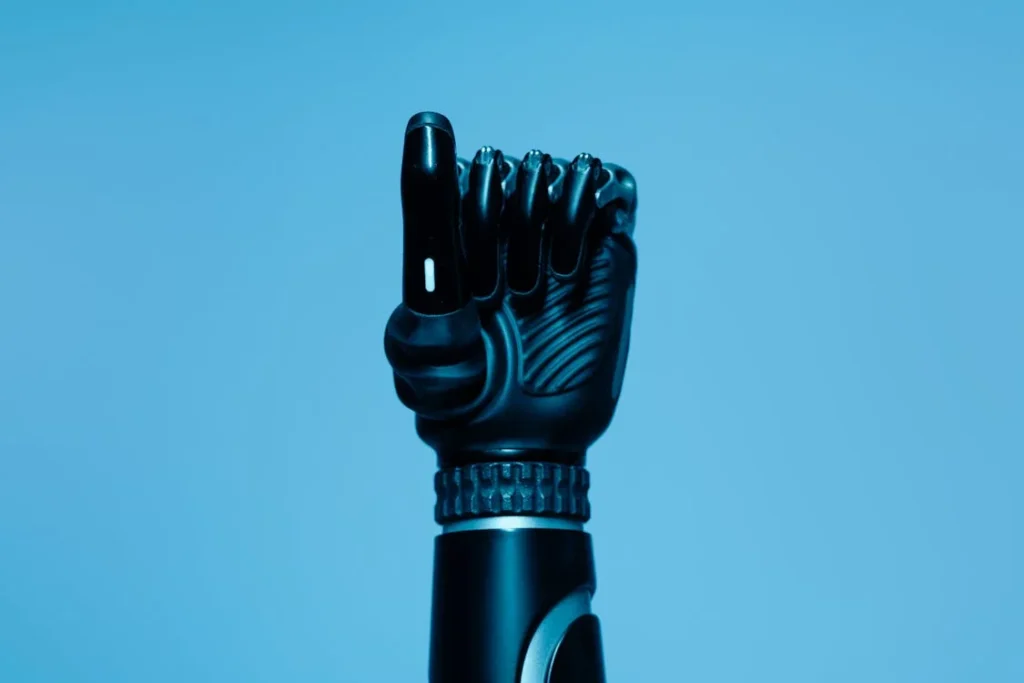
Why Gamified Recovery Is Built for the Teen Brain
Tapping Into the Way Teens Naturally Learn and Grow
Teenagers are wired to learn through challenge, reward, and connection. Their brains crave stimulation. They thrive on social feedback. They’re constantly seeking things that feel exciting, personal, and relevant. That’s why a “game” approach to recovery makes so much sense—because it matches how they already engage with the world.
Gamification turns recovery into something that speaks their language. Instead of sitting in a clinic, doing repetitive motions, teens get to jump into a world that feels like them. A space where progress is colorful, immediate, and fun. A place where hard work is rewarded and visible.
Every point they earn, every level they unlock, reinforces their effort. Not just in theory—but in real, trackable progress. This is how teens learn best—not with lectures or long explanations, but with real feedback tied to real action.
By designing recovery experiences that mirror how teens already use apps, games, and social media, we remove the friction. We invite them into rehab instead of pushing them toward it. That shift in approach creates lasting engagement—and better outcomes.
Challenging the Brain and Body Together
Recovery isn’t just about the hand or the arm. It’s also about the brain. Especially with myoelectric prosthetics like our Grippy™ Bionic Hand, the brain plays a huge role in learning control, timing, and coordination.
Gamified rehab makes sure both brain and body get trained together.
When a teen is aiming for a target on the screen, they’re not just flexing muscles—they’re making fast decisions. When they’re racing a timer, they’re building both focus and reaction time. When they’re solving puzzles through motion, they’re forming new neural pathways that improve movement and mental flexibility.
This kind of active learning is deeply engaging for teens. It keeps them present. Focused. Motivated. And because it feels like a game, they don’t even realize how much they’re training their mind.
Over time, this blend of brain-body connection leads to smoother control, more confidence, and faster progress with their prosthetic.
Replacing Shame With Storytelling
One of the hardest things teens deal with is shame. Not because there’s anything wrong—but because society can make them feel like they’re supposed to be “perfect.” And when they feel different, they start pulling back. Hiding. Saying less. Trying not to be seen.
Gamification flips that.
It gives them a new story.
Instead of a story about what they can’t do, they build a story of what they’ve achieved. A story told through points, progress bars, and challenges overcome. Every screen becomes a page in that story. Every unlocked skill becomes a sentence of strength.
And when they share that story—with a friend, a parent, or their online peer group—it gets stronger. It becomes part of who they are.
We’ve seen teens go from hiding their prosthetic to showing it off. Not because we told them to—but because they earned the right to be proud. Gamified recovery helped them see themselves differently. And that new story? That’s the beginning of self-acceptance.
The Power of Belonging in Recovery
Teens want to be part of something. A team. A trend. A circle of people who “get it.” Recovery can feel isolating, especially if they’re the only one in their class or community with a limb difference. But when rehab includes peer interaction, that loneliness starts to fade.
In our platform, teens can see others just like them training, growing, and thriving. They’re not alone anymore. They’re part of something bigger—a community of resilience and progress.
Even simple features like “You and Aisha both earned 200 points this week!” help create a quiet bond. They remind users that others are trying too. That someone else is also showing up, practicing, succeeding. And when a teen sends a “high five” or gets a message saying “You’re doing awesome,” it lifts them in ways we can’t always measure.
That social reinforcement is one of the most important factors in teen motivation. It’s what keeps them engaged, even when the exercises get tough. It turns effort into shared experience—and experience into pride.
Helping Teens Stay Consistent Without Feeling Forced
Building new habits is hard at any age, but for teens, it’s especially tricky. Their schedules are full. Their attention shifts quickly. They’re balancing school, friends, phones, emotions—and now, recovery too.
Gamified rehab meets them where they are.
Instead of strict time blocks, the app offers flexibility. A challenge can take just a few minutes. A quick win counts. And when they miss a day, they’re not scolded—they’re gently encouraged to try again.
This low-pressure approach keeps them coming back. It doesn’t rely on guilt. It relies on joy. On fun. On the satisfaction of progress.
Over time, this rhythm builds a consistent habit. Not because someone is making them do it—but because they want to. That internal motivation is what drives the best results. And it’s why our teens often go beyond what’s expected. Because they enjoy the challenge. They own it.
And when you own something, you grow from it.

Schools as Partners in Gamified Recovery: Empowering Teens Where They Learn
Why the Classroom Is More Than Just a Learning Space
For most teens, school is where they spend a huge part of their day. It’s where they’re challenged, tested, supported, and shaped. But for teens with limb differences, it can also be where self-doubt grows. They may feel different while writing, participating in sports, or even carrying their lunch tray. The smallest actions can feel like big, public moments of anxiety.
But schools can also be a place of transformation—especially when educators and staff know how to support recovery in meaningful ways.
By recognizing the role of gamified rehab, schools can go beyond academic support and become a daily part of a teen’s physical and emotional growth.
Bringing Gamified Tools Into the School Routine
Imagine a teen using our Grippy™ Bionic Hand, attending school every day, and practicing with their gamified rehab app between classes or during a quiet period. A five-minute session between subjects. A ten-minute challenge after lunch. These moments aren’t just convenient—they’re powerful.
Recovery doesn’t need to happen only at home or in clinics. When schools create small pockets of time for practice—just like they do for reading or mindfulness—it reinforces that healing is part of normal life. It makes the prosthetic part of the student’s daily rhythm, not an afterthought.
And when teachers treat those moments with the same respect they give to test prep or homework, the student feels supported. They feel seen.
Gamification makes this process smoother. The tech is lightweight, the practice is engaging, and the results are trackable. Schools can easily fold it into daily life without adding pressure. And when progress happens during the school day, teens begin to associate their learning space with success, not just survival.
Educators as Encouragers, Not Just Instructors
Teachers play a huge role in how confident teens feel. A single comment—positive or negative—can shape how a student views their abilities. When educators understand the recovery journey and the role of gamified tools, they can be powerful allies.
Simple encouragement goes a long way. “I saw you earned a new badge—amazing work!” or “Keep going, I know that challenge is tricky!” These aren’t just nice words. They’re proof that the student’s effort is visible. They tell teens, “What you’re doing matters, not just at home, but here too.”
Educators don’t have to be rehab experts. They just need to be open-minded and supportive. Gamified apps give them a window into the student’s growth, without needing complex reports or medical charts. That visibility builds empathy—and better relationships.
Fostering Inclusion Through Awareness and Activity
Many teens with limb differences are excluded—not because others are mean, but because no one knows how to include them. When a prosthetic looks different or works differently, peers might hesitate to ask questions. They’re curious, but afraid to offend. That silence leads to distance.
But when gamified recovery becomes part of the school story, inclusion starts to bloom.
Teens who use the app can explain what they’re working on in a fun, relaxed way. They might even challenge a classmate to beat their score. Suddenly, the prosthetic isn’t a secret. It’s a tool. A strength. A source of connection.
We’ve seen students lead mini sessions showing friends how they practice. We’ve watched classmates cheer when someone hits a new milestone. These moments build bridges. They shift the conversation from “different” to “awesome.”
And when schools support this kind of openness, confidence multiplies.
Creating a Network of Support Around the Student
The best part of integrating gamified recovery into school life is that it creates a wider safety net. Now, recovery isn’t just a conversation between the teen and their parents—it’s something shared between therapists, teachers, counselors, and friends.
Everyone plays a role. The therapist recommends a challenge. The teacher celebrates it. The friend cheers them on. The teen feels held—not in a limiting way, but in an empowering one.
This support system becomes especially important during hard weeks. When motivation dips, or when a challenge feels impossible, knowing that others believe in them can be the boost a teen needs.
That belief—shared across adults and peers—is sometimes more powerful than any app or tool. It becomes the wind beneath their wings.
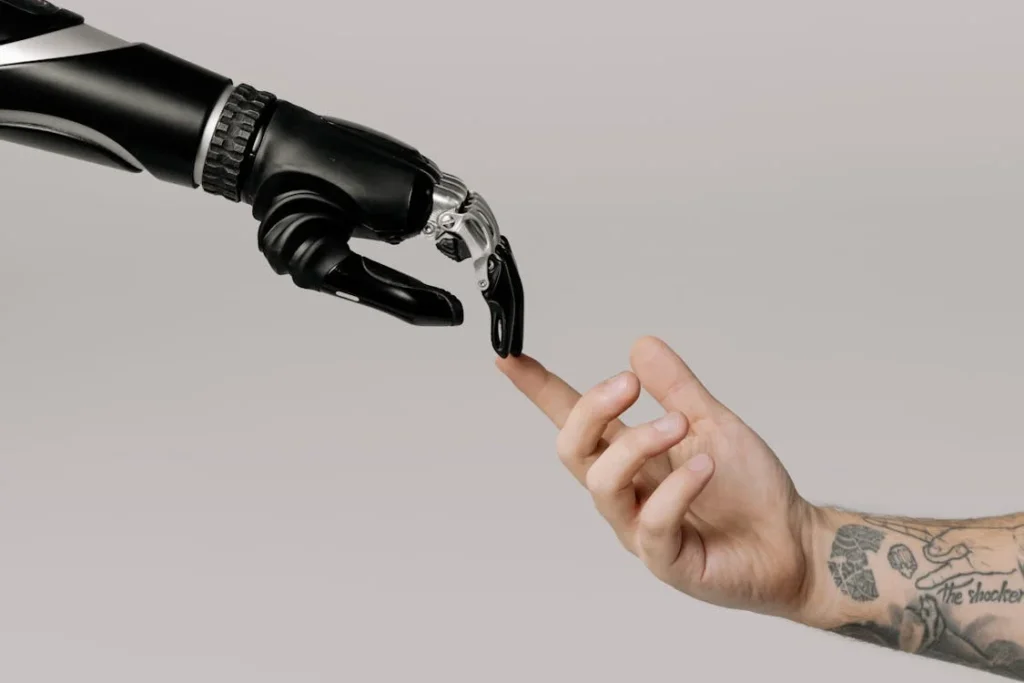
Body Image, Self-Esteem, and the Silent Struggles of Teen Recovery
Looking in the Mirror Shouldn’t Feel Like a Battle
Teenagers everywhere deal with body image issues. It’s part of growing up. But for teens with limb differences, the mirror can feel especially complicated. They’re not just watching their bodies change—they’re trying to make peace with something that sets them apart in a very visible way.
Every scar, every difference, every tool or prosthetic they wear becomes part of their self-image. And in a world flooded with filtered perfection, that can be heavy to carry. Even if no one says anything out loud, the quiet pressure to “blend in” or “look normal” lingers in their minds.
At RoboBionics, we understand that body image is not just about looks. It’s about acceptance. Belonging. Identity. That’s why gamified recovery isn’t just about movement—it’s about helping teens feel good in their own skin.
Turning the Prosthetic Into a Source of Pride
One of the most powerful moments we see is when a teen stops hiding their prosthetic and starts owning it. That moment rarely happens all at once. It comes slowly, through daily wins. Through comfort. Through stories of strength that build over time.
Gamified recovery gives them those stories.
Instead of focusing on what’s missing, teens start to focus on what’s possible. Every time they complete a challenge or beat their best time, their prosthetic becomes something more than a medical tool. It becomes a symbol of progress. A badge of courage.
The way they look at it starts to shift. They’re no longer asking, “Does this make me look different?” They’re thinking, “Look what I can do with this.” That shift changes the way they carry themselves—and how they see themselves.
We’ve seen teens decorate their prosthetic hands, give them cool names, and talk about them like a sidekick. Not out of denial, but out of pride. That pride doesn’t just change their recovery—it changes their self-image.
Celebrating the Body for What It Can Do, Not Just How It Looks
Traditional rehab often focuses on function, but doesn’t always give space for feeling. Gamified recovery bridges that gap.
In our app, teens aren’t just learning to hold a bottle—they’re winning stars for strength. They’re not just opening and closing their fingers—they’re unlocking grip patterns and crushing game levels. Each action is connected to a win.
This helps teens stop seeing their body as something broken or incomplete. Instead, they see it as a powerful system that’s learning, adapting, and growing. They start to admire what they can do—not just how they look.
That admiration builds self-esteem from the inside out. It becomes less about comparison with others, and more about celebration of self.
From Self-Conscious to Self-Expressed
When teens feel good in their body, they start to express themselves more. They try new styles. They take selfies. They laugh more. They engage. This is a quiet but clear signal that healing is happening—not just physically, but emotionally.
We’ve had teens tell us that after a few months of gamified recovery, they started wearing short sleeves again. Or tying their hair back to show their arm. Or joining school plays and clubs they once avoided. These are not small things. They’re victories.
Gamified recovery creates space for this confidence to bloom—by helping teens rewrite the story they tell themselves about their body. And when they tell a better story, they live a bolder life.
The Role of Digital Wins in Real-World Self-Worth
Some people may wonder, “Do digital badges and scores really matter?” For teens, they absolutely do. Because it’s not about the badge—it’s about what it represents. Effort. Skill. Progress. Strength.
When a teen earns a “Stability Star” or unlocks the “Power Grip” level, they’re not just collecting points—they’re proving to themselves that their body is capable. That capability feeds their self-worth. It reminds them they’re not just surviving—they’re thriving.
That feeling doesn’t stay on the screen. It walks with them into classrooms, friend groups, sports activities, and future goals. It’s a quiet voice that says, “You’ve done hard things before. You can do this too.”
And for a teen navigating the complex world of identity and image, that voice is everything.
Conclusion
For teens with limb differences, recovery is about more than movement—it’s about finding their voice, their pride, and their place in the world. Gamified rehab doesn’t just teach them how to use a prosthetic. It helps them believe in themselves again. Every level they complete, every challenge they overcome, becomes proof that they are capable, strong, and growing.
At RoboBionics, we see these stories unfold every day. Not just in improved grip strength or smoother motion, but in the way teens begin to smile more, show up bolder, and live with greater joy. Recovery becomes something they own—not something they endure.
Confidence isn’t built in a single moment. It’s built in small, steady wins. And when those wins are wrapped in play, supported by peers, and celebrated with pride, something incredible happens. Teens don’t just heal—they rise.
Ready to help a teen in your life take the next step?
Book a demo with RoboBionics today.
Let’s help them discover their power—one game, one goal, one moment at a time.
Ask ChatGPT



